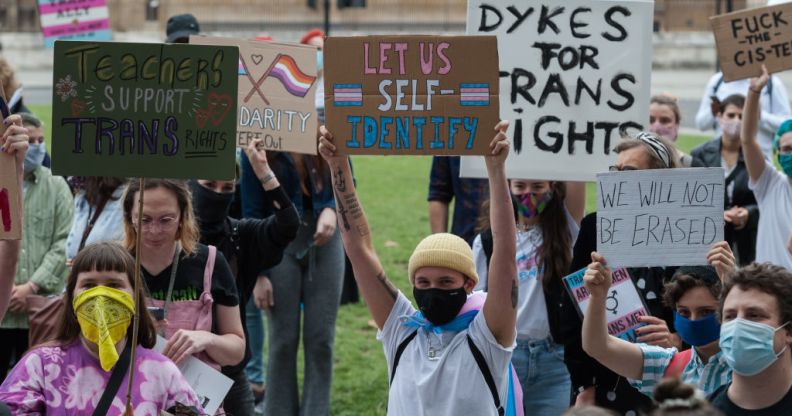Trans people will continue to need a medical diagnosis to have their gender legally recognised after Gender Recognition Act reform, claims Sunday Times

A protestor asks for the right to self-identify their gender in the UK, which was one of the demands campaigners had for reform of the Gender Recognition Act. (WIktor Szymanowicz/NurPhoto via Getty)
Trans adults will continue to need a medical diagnosis of gender dysphoria to change their legal gender even after a reform of the UK’s gender-recognition laws, the Sunday Times claims.
Legal gender recognition for adult trans men and women in the UK is governed by the 2004 Gender Recognition Act (GRA).
Planned updates to the GRA to make it more accessible for trans people have been repeatedly delayed for two years amid a toxic public debate about trans rights.
The Sunday Times reported in June that plans for GRA reform were being scrapped entirely, but subsequent statements from Boris Johnson and his minister for women and equalities Liz Truss suggest this was incorrect.
Fears that the Tories would use GRA reform to restrict access to healthcare for trans youth were also allayed earlier this month when Truss confirmed, in a letter to trans-support charity Mermaids, that any changes to gender-recognition laws will not affect under 18’s.
The Sunday Times today reports that GRA reform will include reducing the £140 fee for legal gender recognition but the requirement for trans people to have a gender dysphoria diagnosis will remain.
One unnamed government source told the newspaper: “We think that the current legislation, which supports people’s rights to change their sex, is sufficient.”
Doctors back trans people self-declaring their gender.
The British Medical Association (BMA), the UK’s professional association for doctors, this week passed a historic motion backing trans people being able to legally self-declare their gender without a medical diagnosis of gender dysphoria.
The BMA also called on the government to ensure the rights of trans and non-binary people in accessing healthcare.
The heated public debate over whether trans and non-binary people should be allowed to self-declare their gender (a system in place in dozens of other countries including Ireland, Malta and Argentina) had put doctors in a “weird position where we’re expected to define what is a valid transition”, Dr Grace Allport, who wrote the BMA motion, told PinkNews.
“We end up as gatekeepers, not just of healthcare but of what is ‘male’ and ‘female’,” Allport said. “It doesn’t feel like a role doctors should be doing – it doesn’t feel like something anyone should be doing for anyone else.”
Reforming the UK’s Gender Recognition Act.
In 2017, then-prime minister Theresa May suggested reforming the GRA after a government report found that only around 5,000 people from the UK’s trans population of roughly half a million people had used the law to change their legal gender.
A huge public consultation on potential reforms of the GRA was held in 2018, with trans activists calling for legal recognition for non-binary trans people, access to legal gender recognition for trans 16- and 17-year-olds, and demedicalising and streamlining the gender recognition process.
A key demand was for the requirement of a medical diagnosis for legal gender recognition to be removed, with May saying that “being trans is not an illness”.
In 2019, the World Health Organization dropped being trans from its list of mental disorders.
The Conservatives have repeatedly delayed publishing the results of this consultation, which was reportedly responded to by more than 100,000 people, but equalities chief Liz Truss promised in July that she would publish both the results and her plan for reforming the GRA “over the summer“.
The Sunday Times reports today that this reform will not include demedicalising the process, as trans campaigners had demanded, meaning that trans people will continue to need a medical diagnosis of gender dysphoria before being able to update the gender marker on their birth certificate.
This change is needed for the administration of taxes, pensions and marriages. It does not affect trans people’s ability to update the gender marker on other documents such as passports or bank accounts, which is possible without going through the process of legal gender recognition, or access to public single-sex spaces like bathrooms.

